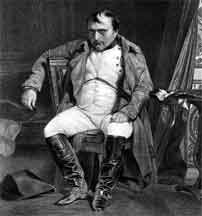
Napoletom Daschle saddenned...
Posted on 06/18/2006 5:21:11 AM PDT by mainepatsfan
This Day In History | General Interest
NAPOLEON DEFEATED AT WATERLOO: June 18, 1815
At Waterloo in Belgium, Napoleon Bonaparte suffers defeat at the hands of the Duke of Wellington, bringing an end to the Napoleonic era of European history.
Beginning in 1812, Napoleon began to encounter the first significant defeats of his military career, suffering through a disastrous invasion of Russia, losing Spain to the Duke of Wellington in the Peninsula War, and enduring total defeat against an allied force by 1814. Exiled to the island of Elba in the Mediterranean, he escaped to France in early 1815 and set up a new regime. As allied troops mustered on the French frontiers, he raised a new Grand Army and marched into Belgium. He intended to defeat the allied armies one by one before they could launch a united attack.
On June 16, 1815, he defeated the Prussians under Gebhard Leberecht von Blucher at Ligny, and sent 33,000 men, or about one-third of his total force, in pursuit of the retreating Prussians. On June 18, Napoleon led his remaining 72,000 troops against the Duke of Wellington's 68,000-man allied army, which had taken up a strong position 12 miles south of Brussels near the village of Waterloo. In a fatal blunder, Napoleon waited until mid-day to give the command to attack in order to let the ground dry. The delay in fighting gave Blucher's troops, who had eluded their pursuers, time to march to Waterloo and join the battle by the late afternoon.
In repeated attacks, Napoleon failed to break the center of the allied center. Meanwhile, the Prussians gradually arrived and put pressure on Napoleon's eastern flank.
(Excerpt) Read more at historychannel.com ...
Oh come now. He's in far better shape than the Swimmer.
No that would have been, "The Russian campaign didn't go as well as Napoleon had hoped."

The days of mass armies fighting over open land are over, IMO.
"The days of mass armies fighting over open land are over, IMO."
Right.
Now armies have to brush up on defeating mass, anarchist organized riots.
"In a fatal blunder, Napoleon waited until mid-day to give the command to attack in order to let the ground dry."
Waterloo Lesson:
Next time you plan on over running your enemy, you might want to include some crewed gun carriages to return the cannon to your own lines, or, at the very least, have a designated group drop out of the charge and spike the guns.
Ney really screwed up on that one.
ping
http://www.alanemrich.com/PGD/Week_03/PGD_NAW_rules.htm
Print out the game and see if you can do better than Nappy.
That might be bad for us, as it puts us in the position to have to do all of the fighting. We are cast as the big bad bully who have to protect everyone else who spend their money on health care. It is something different than what I was saying, though.
Very true. He was awful that day.
http://www.pbs.org/empires/napoleon/flash/n_war/ibs/index.html
Try this one as well.
Did you like it?
Much better the second time around. I loved it. I especially like the way Tolstoy argues that it was the Battle of Borodin that essentially defeated the French, not Moscow per se. There wasn't much of a fight for Moscow itself. Instead, Napoleon's army simply disintegrated after it entered the city. By the time he realized how precarious his position was, it was too late. His retreat, burdened by his plunder and ill-equipped, was the stuff of disaster.
I also think Tolstoy proposes some interesting historical theories, although they do make the last part of the book somewhat ponderous.
Those historical theory chapters are skipped by just about everyone who re-reads the book. Read Anna Karenina.
This topic was posted , thanks mainepatsfan.
Despite everything, Napoleon almost won. “A damned nice thing,” Wellington said later, “the nearest-run thing you ever saw in your life.”
Disclaimer: Opinions posted on Free Republic are those of the individual posters and do not necessarily represent the opinion of Free Republic or its management. All materials posted herein are protected by copyright law and the exemption for fair use of copyrighted works.